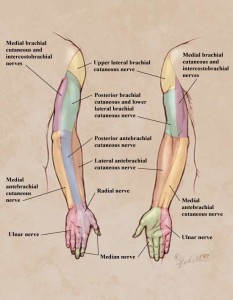There have been so many times when I have been sitting in class or in my room and my arm or leg decided to fall asleep. It is somewhat pleasant at first until the tingling feeling begins. It occurs to me so often, and I usually feel as though I am the only person experiencing it. I had heard that our body parts tend to “fall asleep” due to the blood circulation being cut off and not entering that part of the body. I usually sit with my legs crossed so I thought maybe this had something to do with it. I became curious and finally decided to research the topic to identify the exact reasoning.
The “falling asleep” of our limbs is more formally known as “paresthesia” which is caused when certain limbs are compressed. Sitting a certain way, cross-legged for example as I had mentioned earlier, can put too much pressure on a nerve in that part of the body. The nerve stops sending impulses normally as a result. If the pressure becomes too excessive or is held for a long period of time, the nerve will stop all impulses. This is when the limbs “fall asleep”. These nerve impulses transmit information to the brain. By interfering with this, the brain is losing communication with that limb and has difficulties telling it what to do. The excess pressure can also stop the flow of nutrients to body cells which may cause the limbs to behave differently. When a person restores the impulses by uncrossing their limbs for example he or she experiences the tingling feeling until total function is regained. The impulses that flow throughout these limbs stem from our spinal cord. They have “axons” which connect to our limbs and carry the impulses to the different parts of the body. They are fundamental in our ability to feel everything around us.
This however is not the only way in which a person can experience paresthesia. Excessive vibration can also cause it. If a person uses a hand held tool such as a drill, he or she may have their limbs fall asleep. The reasoning is not quite known.
The common misconception is in fact that the body falls asleep because of lack of blood flow. I was under this impression before I conducted the research. However, if this were to be true, the effects would be a lot more severe and life threatening. If the blood flow was cut off altogether, the limb would start to suffer from compartment syndrome which means it would become very acidic and the cells would break down. Wastes build up in the affected area. Once the pressure in the affected area is released, everything is shot up to the heart resulting in potentially lethal consequences. It would be a shame if this were to happen every time a person sat cross-legged.
To conclude, it is important that we forgo the common misconception that the “falling asleep” of our limbs is due to the lack of blood flow. Such a circumstance would result in much more severe effects on the body. Rather, the nerves are unable to send impulses due to excessive and/or prolonged pressure. We should pay attention to the sensations we may feel and restore the nerve impulses and communication with the brain.



I have experienced this feeling many times and have considered the possibility of lack of blood to the area as well. I just wonder how great the lack of blood would have to be for the effects to be so serious. If the blood flow were only slightly less would it be very traumatic? People can have bad blood circulation to certain areas of the body- is that a similar? I am also interested to hear more about why vibrations would cease the pulses I find that confusing.